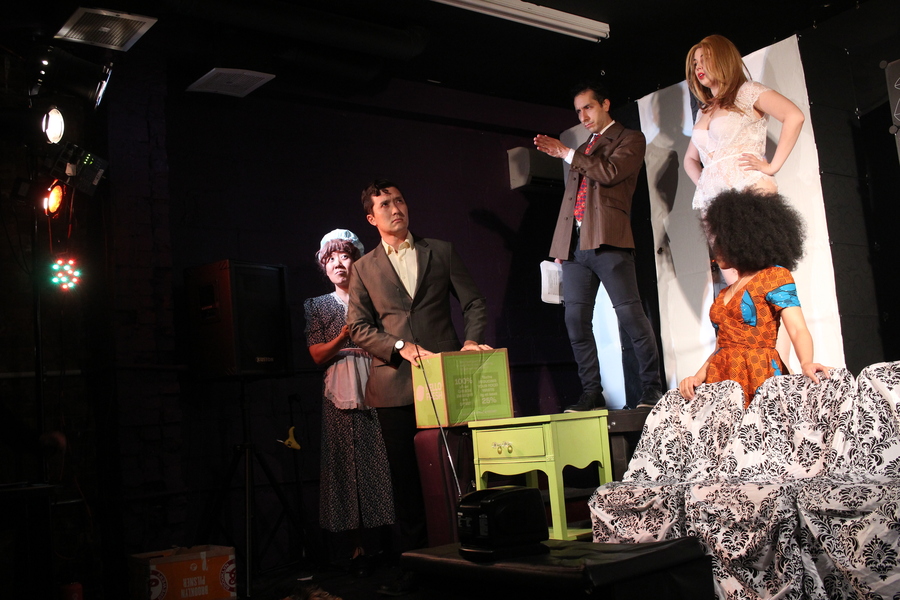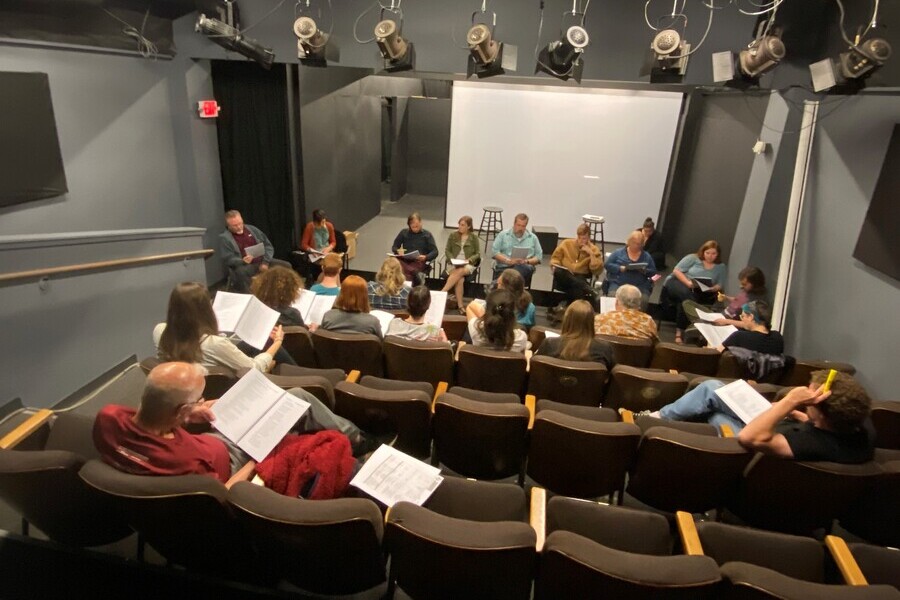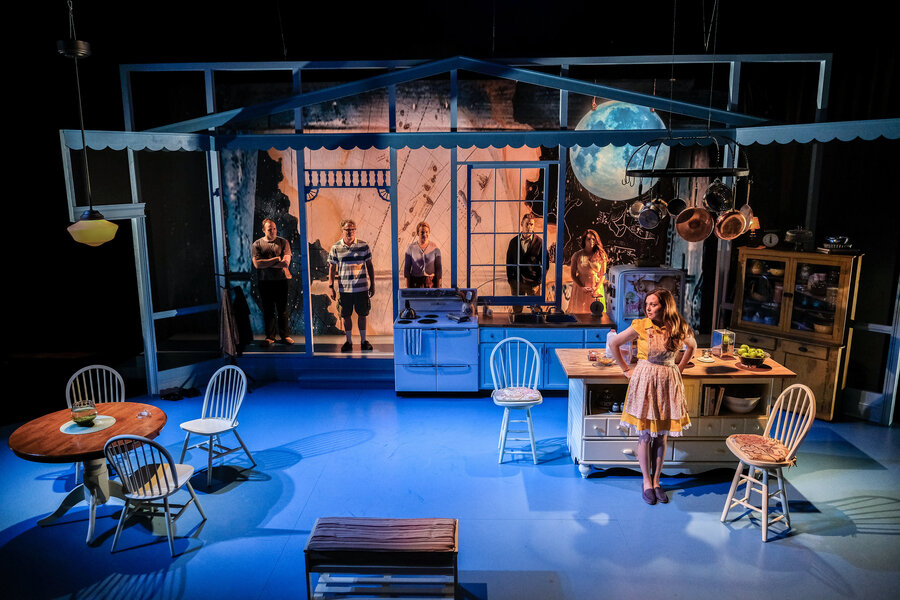More than a year into the COVID-19 pandemic, the theatre industry as a whole continues to hang in the balance. Programming shows may now be as much of a risk for some companies as not programming them. Many theatres across the country have laid off staff, and some have shuttered completely. But some theatremakers have instead decided to scale up over the past 18 months, either by starting their own companies or investing in a permanent space for their work. From coast to coast, here are four companies that are filling a culture gap for their communities at a moment when live, in-person theatre seems poised to come surging back.

Brooklyn: Sour Grapes Productions
In February, Genny Yosco (she/her) and her producing partner, Chris Weigandt (she/her), signed a one-year lease for a new space for their company in the Brooklyn neighborhood of Williamsburg—and then, three weeks ago, learned that the building had been sold. To their great relief, they found another place in East Williamsburg a week later, and have christened it the Vino Theatre.
As Sour Grapes Productions, the two have been producing sketch comedy and comic interpretations of Shakespeare, and collaborating with clown and improv companies, to bring laughs to New Yorkers for the past six years. The company originally began when Yosco was working at a children’s theatre in West Virginia and wasn’t thrilled with the way it was being run. She wanted to see more diversity, for one thing.
“We strive to add LGBTQ representation in classic Shakespeare work,” Yosco said. “Sometimes it makes more sense than the original. It enhances the storytelling. We also want to get artists paid.”
The small, ambitious company ramped up their virtual programs last year and plans to produce several in-person events in the fall, including an improv festival, a fringe festival, and the new Madonna Whore Feminist Playwriting Festival. They’re also bringing back their So Many Shakespeares Festival, in which different companies produce their own interpretation of one of Shakespeare’s comedies.

Washington: Spokane Shakespeare Society
The team at Spokane Shakespeare Society has one goal: to provide their community with stagings of Western classics. Executive director Amanda Cantrell (she/her) and her husband and co-founder R. Scott Cantrell (he/him) noticed a lack of both outdoor theatre and Shakespeare production in Spokane, a city where appreciation for the arts is high. Both had worked at other professional theatres across the country, including Shakespeare Dallas, so they knew that there was an appetite for it.
“Scott is a Shakespearean scholar, and Shakespeare is royalty-free, which helps with our overhead,” Amanda Cantrell said. “Plus, everybody knows Shakespeare. Our challenge is not to get the audience familiar with the plays, but to reinvigorate them.”
Prior to moving to Spokane, they lived in Manokotak, Alaska, a Native American community along Bristol Bay. While there, they started a drama club and used their expertise in puppetry to create puppet theatre with the community.
Community is mission critical for the Cantrells. When the Spokane City Parks & Recreation department renovated the pavilion at River Front Park downtown, they jumped at the opportunity to produce in the space. Their insurance provider and bank are local. They also reached out to universities and high schools in the area to recruit people to audition.
“We want to make sure we’re giving back to the community,” Amanda Cantrell said. “We are paying our actors and designers a stipend since we both have Equity backgrounds. Our hope is that one day we’re a TCG member theatre and an Equity theatre.”
Their first production will be A Midsummer Night’s Dream, which opens the first weekend in August with eight performances. In September, they’ll produce The Complete Works of Shakespeare Abridged. Tickets for all of the shows are pay-what-you-can.
“Destination tourism is the type of thing that Savannah has the potential to do with theatre. We’re trying to bring a 54 Below vibe to Savannah.”
Georgia: Savannah Repertory Company
Life keeps bringing Ryan McCurdy (he/him) back to Savannah. First, he went to Savannah College of Art & Design to earn his undergraduate degree in performing arts. A few years after graduating, he moved to New York to pursue an acting and music career. In 2016, Savannah Repertory Company, the Georgia city’s first union house, opened, and in 2018 McCurdy landed a role in their production of Pump Boys & Dinettes. That role led to him assuming a position on the theatre’s board of directors a year later. Now he’s taken the helm as executive artistic director while the theatre is reorganizing and planning a move into a new space next spring.
Like many theatres when the COVID-19 pandemic hit, Savannah Rep was not certain it would survive. They’d parted with the founding artistic director a month before quarantine and there wasn’t much money in the bank. By June 2020, their landlord was demanding full rent. As McCurdy puts it, the board had a crisis call and decided they needed to either expand or contract. The community and the board were determined not to lose the theatre.
Around that time, a former car dealership’s showroom on the buzzing corner of Broughton and Habersham in downtown Savannah became available. McCurdy called the owners, and together they “built a lease around our real-world numbers.” To date, they’ve raised $150,000 in grants and individual gifts to renovate the building. When it opens in spring 2022, they’ll be able to seat up to 160 people, plus host events for up to 70 people in the lobby.
“Destination tourism is the type of thing that Savannah has the potential to do with theatre,” McCurdy said. “We’re trying to bring a 54 Below vibe to Savannah.”
In addition to securing space, the team at Savannah Rep wants to make sure that the entire community feels welcome. They are collaborating with the Performing Arts Collective, a group of the city’s African American cultural organizations, on programming, audience engagement, and equitable space rentals. They are also working to ensure that the board is 50 percent people of color and that they hire diverse staff as positions come available.
“The perfect audience member for us is someone who has never felt like they had a place in theatre, but feels immediately at home in our space, and begins a lifetime of arts interest and connection because they were given a space that does not feel exclusive,” McCurdy said.

Detroit Public Theatre
Growing up in Ypsilanti, Mich., Sarah Clare Corporandy (she/her) says she never thought that she would be able to make a living as an artist. It wasn’t until she earned her Master’s degree at Wayne State University she realized that in arts administration she could server her community by creating opportunities. In 2015, she founded Detroit Public Theatre along with her co-producing artistic directors, Courtney Burkett and Sarah Winkler.
In just a few years, they’ve garnered national recognition. They are the first theatre in the city to have produced Dominique Morisseau’s Detroit Trilogy, and their first commissioned work, Birthday Candles by Noah Haidle, is moving to New York next year, with local director Vivienne Benesch directing her first Broadway show. Next spring they’ll move into a new space in midtown Detroit, with Morrisseau on board as executive artistic producer.
“We knew it would be a long path to growth, so in year two we started working on a five-year strategic plan with the board,” Corporandy said. “We had a residency with the Detroit Symphony that was amazing, but it was expensive for a young company. When we started looking for a permanent location, we looked at over 30 locations over the course of a year in the cultural hub of the city.”
As DPT expands, their service to the community is also growing. During the pandemic, they continued their signature community engagement program, Shakespeare in Prison, by sending activity packs to their group. They hosted Zoom readings with program alumni who have since been released. During a regular season, they also hire some of the program alumni to help build sets and work at the theater in order to help prevent recidivism.
“There’s a core of the city that has always been there and we’re for that audience, we’re for that community,” Corporandy said. “I know we want to say theatre is for everyone, but not everyone has gotten that message. We have the opportunity to show that through how we invite people in and who we partner with.”


